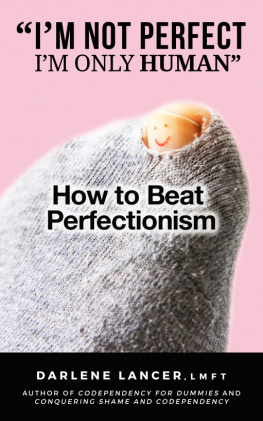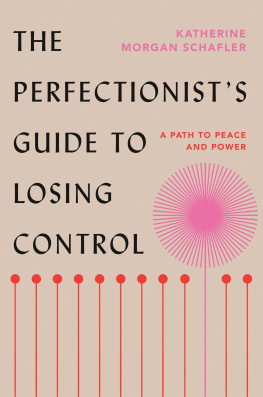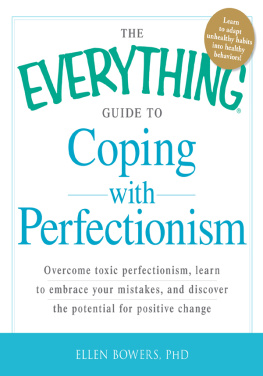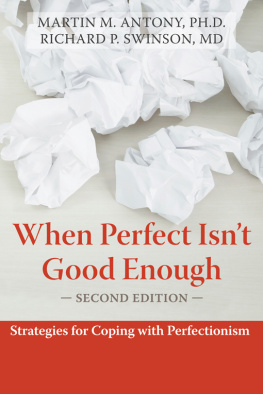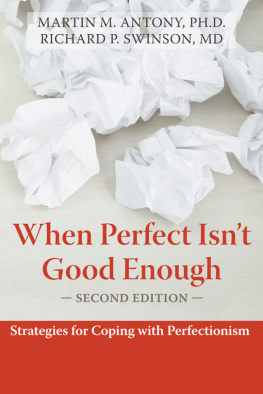Im Not PerfectIm OnlyHuman
How to Beat Perfectionism
By
Darlene Lancer, LMFT
Author of:
Codependency for Dummies
Conquering Shame and Codependency: 8 Steps toFreeing the True You
Dealing with a Narcissist: 8 Steps toRaise Self-Esteem
and Set Boundariesin Difficult Relationships
10 Steps to Self-Esteem: The Ultimate Guide toStop Self- Criticism
How To Speak Your Mind - Become Assertive andSet Limits
Freedom from Guilt and Blame - FindingSelf-Forgiveness
Spiritual Transformation in the TwelveSteps
Codependency's Recovery DailyReflections
How to Raise YourSelf-Esteem (Webinar)
How to Be Assertive (Webinar)
Im Not PerfectIm OnlyHuman
How to Beat Perfectionism
Darlene Lancer
2017 Darlene Lancer, JD, LMFT
Carousel Books
Special Smashwords Edition
All rights reserved. No part of thispublication may be reproduced, stored in a retrieval system ortransmitted by any meanselectronic, mechanical, photographic(photocopying), recording, or otherwisewithout prior permission inwriting from the author.
The information in this book is intended tobe educational and not for diagnosis, prescription, or treatment ofany mental health disorder. Without a personal, individual,professional consultation with you, the author is unable to giveyou professional psychological advice. Hence, you understand thatthe material contained herein is general in nature, and the authordisclaims any personal liability, directly or indirectly forsuggestions and information in this book.
Printed in the United States of America
Learn more at www.whatiscodependency.com
Table of Contents
Introduction
Perfectionism affects roughly 30 percent ofthe population and as much as 87 percent of gifted people. Its onthe rise. The American Dream endorses striving for achievement,an ideal mate, a flawless body, perfect family, and success in aschool and career of our choice. The media and advertisingreinforce this fantasy of attaining perfection, while the actualstruggles of life and human frailty go unseen. Romantic movies endwith wedding vowsbefore the challenges of marriage set in. Weremisled by pictures of enchanting resorts with breezy, bejeweled,air-brushed models in designer gownsactually overworked, starvingyoung girls, who are often exploited. TV shows like the Cosbyshide the dark character of the real life Bill Cosby. Commercialspromise attracting perfect, gorgeous, sexy mates by using theirmust-have cigarette, cologne, new car, or shampoo.
We aspire to match these images andachievements of people we admire in the arts, sciences, andbusiness. Our imaginations and ambition conjure boundlesspossibilities to fulfill our desires, but with little regard to ourability to manifest them and our individual limitations. We dontconsider their years of training, effort, experimentation,disappointments, sacrifices, and persistence. The end product isoften the result of agonizing trial and error, not instantperfection. It requires the ability to be patient, tenacious, andself-forgiving.
Perfectionism can be a blessing or a curse.When it helps us, it lifts our mood, and we can achieve significantaccomplishments and greater organization. But for some of us,perpetually seeking an illusion can have serious consequences. Itcan become a painful trap from which were unable to escape. Itsself-sabotaging side effects undermine our goals and creativity andspill over onto our co-workers and loved ones, damaging ourrelationships.
Usually, perfectionism extends to ourappearance, work, home, and family. Things must be in place, andour spouse and children must do their bestaccording to us. Wecant accept differences in others. Either we negatively compareourselves or judge others against our idealistic standards. We mayeven become competitive and undermine our partners efforts orsuccesses. When our self-criticism is projected, we make othersfeel anxious, unappreciated, and unacceptable.
When our self-worth is contingent onattaining impossible flawlessness, perfectionism can also lead toemotional problems. As the title suggests, it can be adehumanizing, compromising our ability to feel love and experiencejoy. The anxiety and shame that perfectionism produces have beenlinked to depression, anorexia, and suicide.
Fortunately, there are concrete steps we cantake to be free of perfectionism. Part I of this book definesperfectionism and discusses common myths that perfectionists have.Different types of perfectionists, the cause of perfectionism, andcommon symptoms, thoughts, and behaviors are described. Howperfectionism impacts relationships is examined. Ten chapters inPart II lay out the steps and detailed exercises to overcomeperfectionism and achieve greater self-acceptance. The Appendixcontains a personality test and parenting tips to build self-esteemrather than perfectionism.
Reading this book without applying thesuggestions wont generate sustained improvement. The guidance of atrained mental health provider can be of significant help. Bepatient with yourself. Changing behavior and thinking patternstakes attention and practice. Best wishes on your journey.

PART I
UNDERSTANDING PERFECTIONISM
1.
What IsPerfectionism?
Perfectionists believe theres a specific, correct way to be,look, and act in accordance with their excessively, high standards.They chase an illusion in their mind that may bear littlecorrelation to reality. Attaining perfection feels required, andanything less is insufferable. Their sense of satisfaction,well-being, and self-worth is dependent on it.
Perfectionistic behavior and thinking can becompulsive and obsessive. Repetitive acts and automatic, unwantedthoughts persist without conscious choice or control. This is whatmakes perfectionism an addiction, meaning we cant stop ourselves.Like other addictions, it varies in severity and can have negativeconsequences.
It harms our self-esteem, makes us unable toaccept our mistakes and flaws, as well as those of other people.When theres only one correct standard, differences anddisagreements are hard to accept. Intolerance can damagerelationships, and perfection-driven behavior can rob us of timewith loved ones. Some of us attempt to perfect our bodies withrepeated surgeries or pursue athleticism to the point of injury.Perfectionism makes us anxious and can actually cause the pooroutcomes we seek to avoid. Severe perfectionism has also beenlinked to other mental health problems.
A Definition
The Webster Dictionary defines perfectionismas:
A disposition to regard anything short ofperfection as unacceptable.
The Merriam Webster Medical Dictionaryadds:
Especially: the setting ofunrealistically demanding goals accompanied by a disposition toregard failure to achieve them as unacceptable and a sign ofpersonal worthlessness.
Having high standards alone doesnt make usa perfectionist. Its when nothing short of perfection isacceptable. Its when we feel compelled to strive to achieve ourdemands and refuse to accept what is. The disparity between realityand our expectations generates internal conflict, self-doubt, andfear of mistakes that cause suffering and problematic symptoms.
Elements ofPerfectionism
Striving to achieve high standards isnt asproblematic as the impact of not meeting them has on ourself-evaluation and our lives. Below are components that contributeto perfectionism. They vary both in degree and amongperfectionists, but the first four are essential to being aperfectionist:
Next page
